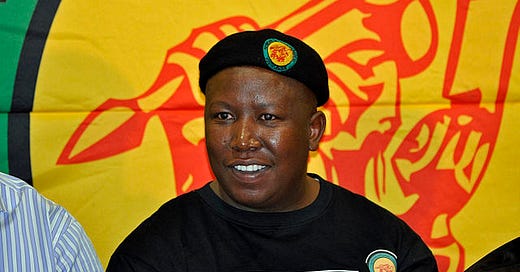🔅 "Kill the Boer" & Kenya Ready to Help Haiti's Security Woes
Plus, A Tangle of Human Ancestry Unfolds & US Slaps Sanctions On Malian Junta
Photo of the day: Seychelles

Markets:
🔴 Nigerian SE: 64,192.20 (-0.23%)
🔴 Johannesburg SE: 78,641.91 (-0.43%)
🟢 Ghana SE: 2,976.77 (+4.91%)
🟢 Nairobi SE: 106.88 (+1.32%)
🔴 US S&P 500: 4,576.73 (-0.27%)
🔴 Shanghai Composite: 3,290.95 (-0.003%)
*Data accurate as of the close of markets across the continent
Brief & Bright: Africa's Top Five Highlights

🇳🇪 The Longest Coup Belt in the World: It's a Young Man's Game
You’ve heard of the Rust Belt, but how about the Coup Belt? This 3,500-mile-long corridor of military rule runs from Guinea in the West to Sudan in the East. It just got a new member this past week with the military takeover in Niger. The Coup Belt is causing serious concerns for the US and its allies, as it’s located in the Sahel—a semi-arid region that’s become the global epicenter of jihadist violence. What’s driving the Coup Belt? Corruption, militancy, and weak states. One other major factor is a youth bulge of frustrated, jobless young people. Indeed, most of the recent coups have been led by men in their 30s or 40s, while the average leader is in their 60s.
𖢞 Unravelling the Human Family Tree: A Complicated Story

We all want to know our family’s origin story, but when it comes to human ancestry, the plot just got thicker. Recent genomic studies are leading experts to believe that the stem of our species isn’t a single straight line tracing back to one place, but a web of different families that stretch across the African continent. Researchers argue that before Homo sapiens left Africa for Europe, there was continuous gene flow between at least two different populations. This tangled lineage might have been the one to leave Africa for Europe around 50,000 years ago—although the genomic data suggests that the first humans in Africa left for Europe 10,000 years later than they should have. Scientists are using genomic sequencing to try to trace the steps of our ancestors, and the more they read, the more complicated the story gets.
🇿🇦 Malema's “Kill the Boer” Performance: South Africa's Opposition Divided
South Africa's main opposition party, the Democratic Alliance (DA), has called out their main radical left rival, the Economic Freedom Fighters (EFF), for singing a controversial anti-apartheid chant at a recent rally. Leader of the DA, John Steenhuisen, accused Julius Malema (aka Juju) of inciting “mass murder” and labelled him a “bloodthirsty tyrant.” Malema sang the “Kill the Boer” chant to some 90,000 cheering supporters in a crowded stadium in Soweto. The Boers are the descendants of the first Dutch settlers. It’s all part of the EFF leader’s effort to build a show of force ahead of next year's elections. The DA plans to file a complaint against the charismatic and provocative Juju, who spent a long time on stage wearing his signature red beret and surrounded by red and gold confetti. South Africa’s current ruling party, the African National Congress (ANC), may lose its majority and the presidency for the first time ever, and the EFF is determined to seize the moment.
🇰🇪 Kenya Ready to Help Haiti's Security Woes

Haiti’s having a bit of a security issue right now. It’s so bad that the U.N. Secretary-General Antonio Guterres has welcomed Kenya’s readiness to lead an international force to help Haiti’s police combat gang violence. The Caribbean country requested international security help last year, and Guterres backed that request. Kenya, who is ready to deploy 1,000 police officers, has been the first to actually offer help. The U.S. had lobbied Canada to lead the deployment, since both countries speak French. And while Canada is still having conversations with the U.N. about what they can do, they’ve already pledged C$100 million ($75 million) in aid for Haiti’s police. Until now, Haiti has been without any elected representatives since January.
🇲🇱 US Slaps Sanctions on Malian Junta
The US is not playing around with the military junta in Mali. Three of the junta’s top officials were hit with sanctions for their involvement with the Wagner Group, a shadowy Russian mercenary group accused of committing atrocities alongside the Malian army. According to the US, civilian casualties in the country have more than tripled since Wagner forces were deployed to Mali in late 2021. Mali’s government has never officially acknowledged Wagner’s presence, but the US believes there are about 1,000 soldiers in the country, and the mercenary group has been accused of abuses like summarily executing and forcibly disappearing civilians. While Malian officials have said in the past that there are Russian military instructors in the country, they have never admitted the presence of Wagner. It looks like the US isn’t taking any chances.
Food for Thought
“He that has never traveled thinks that his mother is the only good cook in the world.”
— Kenyan Proverb.
Are we hitting the mark?
Enjoying Baobab's updates? Spread the joy and share us with friends and colleagues — we'd be thrilled to have them join!
Feedback or thoughts? Just hit reply. We're all ears!





